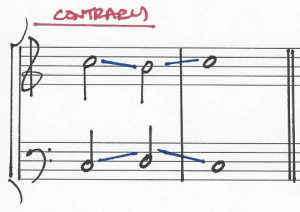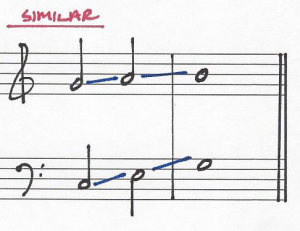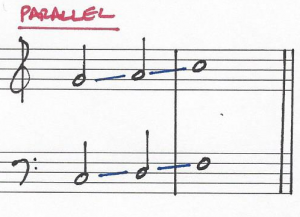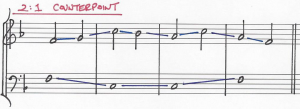Considerations for Creating a Strong Melody
1. Range: Keep each voice within its proper range.


2. Desired motion: Move primarily by stepwise motion.
3. Chromatic intervals: Avoid difficult chromatic intervals (A2, A4, d5) in melodic lines.
4. Leaps: Use sparingly, especially larger than a fifth. Follow leaps with stepwise motion in the opposite direction when possible.
5. Resolve sensitive tones.
- Half steps in major (rolling ball chart)
- Chromatically raised pitches resolve up, lowered resolve down
- Chromatic 6 and 7 scale degrees in minor: raised leading to tonic, lowered leading to dominant
Motion Between Voices
| Contrary Motion: voices move in opposite directions (first choice) |  |
| Oblique Motion: one voice is stationary while the other voice moves against it (second choice) |  |
| Similar Motion: voices move in the same direction, but by different intervals (third choice) |  |
| Parallel Motion: voices move in the same direction by the same interval (avoid if possible, especially perfect intervals) |  |
Counterpoint
Counterpoint (aka polyphony) – the simultaneous sounding of two or more melodic lines displaying independent rhythms and/or contours.
The lines should complement each other in some way. Multiple unrelated melodies played at the same time are technically counterpoint, but only in the loosest sense. The result should be musical coherence.
Outer Voice Framework
Strong counterpoint between the soprano and bass voices (the outer voices in a 4-part texture) is created by using contrary or oblique motion where possible. Using parallel motion too often robs each melody of its independence.
1:1 Counterpoint
AKA First species counterpoint, note against note counterpoint
A single note in one voice against a single note in another.

2:1 Counterpoint
AKA Second species
Two notes in one voice against one note in another.


Leave a Reply